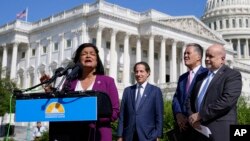Progressive Democratic lawmakers Tuesday retracted a letter, sent earlier this week to U.S. President Joe Biden, urging him to shift the U.S. approach to the war in Ukraine by directly negotiating with Russia.
In a statement on Tuesday, Representative Pramila Jayapal, co-chair of the Congressional Progressive Caucus, took responsibility for the mistaken release.
"The letter was drafted several months ago but unfortunately was released by staff without vetting,” she explained.
Thirty House Democrats signed the letter, news of which was first reported by The Washington Post, telling Biden that diplomatic efforts should also be a part of the U.S. approach to ending the war that has taken a catastrophic toll on the Ukrainian people as well as threaten global food supplies and poverty crises through rising fuel and grain costs.
"As legislators responsible for the expenditure of tens of billions of U.S. taxpayer dollars in military assistance in the conflict, we believe such involvement in this war also creates a responsibility for the United States to seriously explore all possible avenues, including direct engagement with Russia, to reduce harm and support Ukraine in achieving a peaceful settlement," the lawmakers wrote.
But Tuesday morning, Representative Sara Jacobs, a caucus member, tweeted, “Timing in diplomacy is everything. I signed this letter on June 30 but a lot has changed since then. I wouldn’t sign it today.”
Representative Mark Pocan, a former co-chair of the caucus, also tweeted, “This was written in July & I have no idea why it went out now. Bad timing. Second, it was trying to get to a cease-fire & diplomacy as others were banging war drums, not criticizing Biden.”
At a June 2022 press conference, Biden acknowledged the possibility of diplomatic negotiations when asked if Ukraine would have to cede territory to Russia to end the conflict.
"It appears to me that at some point along the line, there's going to have to be a negotiated settlement here. And what that entails, I don't know," Biden told reporters.
In the original letter, the lawmakers specified it was not the place of the United States to pressure Ukraine into accepting a settlement, writing that any "framework would presumably include incentives to end hostilities, including some form of sanctions relief, and bring together the international community to establish security guarantees for a free and independent Ukraine that are acceptable for all parties, particularly Ukrainians."
The U.S. has sent nearly $60 billion in humanitarian, economic and military aid to Ukraine since Russia's unprovoked invasion in February.
“Our message is being conflated by some as being equivalent to a recent statement by [House Minority] Republican leader Kevin McCarthy threatening an end to aid if Republicans take over,” Jayapal said in the retraction letter. “The proximity of these statements created the unfortunate appearance that Democrats, who have strongly and unanimously supported and voted for every package of military, strategic and economic assistance to the Ukrainian people, are somehow aligned with Republicans.”
McCarthy, who is poised to become House speaker if Republicans win control of the chamber in the November midterm elections, said continuing U.S. aid to Ukraine is not assured, given domestic economic concerns.
"I think people are going to be sitting in a recession, and they're not going to write a blank check to Ukraine," McCarthy told U.S. political news outlet Punchbowl News last week.
Not all Republican leaders agree. In a statement last Friday, Senate Minority Leader Mitch McConnell called for more U.S. aid to Ukraine.
"The Biden administration and our allies need to do more to supply the tools Ukraine needs to thwart Russian aggression," he said. "It is obvious this must include additional air defenses, long-range fires, and humanitarian and economic support to help this war-torn country endure the coming winter."
Progressive Democrats praised Biden’s approach to the conflict in their original letter, and in her retraction, Jayapal said, “Every war ends with diplomacy, and this one will, too, after Ukrainian victory.”








